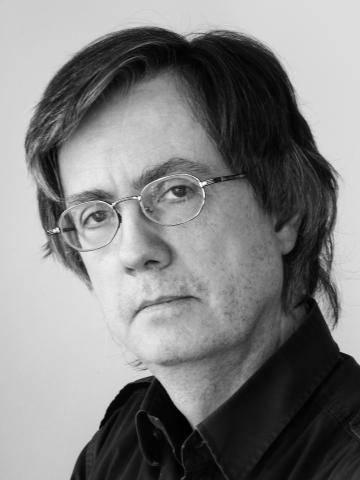Bio
Sigurjón Magnússon was born in Reykjavík on January 19th, 1955. He grew up in the west part of town where he went to school. He studied Icelandic and English at The University of Iceland. Sigurjón has done various jobs through the years, until becoming a full time writer in 1997. He taught at elementary- and secondary schools, worked in a home for recovering alcoholics and sold insurances, to name a few. In 1992 he founded the publishing house Ormstunga together with his brother-in-law Gísli Már Gíslason and worked there for some time.
Sigurjón Magnússon’s first published work is the novel Góða nótt, Silja (Good Night, Silja) from 1997 which won acclaim among both critics and readers. Since then he has sent forward six other novels, one of them an historical novel about the writer Kristmann Guðmundsson, Borgir og eyðimerkur (Cities and Deserts). His latest novel is Snjór í myrkri (Snow in Darkness), published in 2014. Góða nótt, Silja was published in a Swedish translation in 2000.
Sigurjón Magnússon lives in Kópavogur. He is married and has two children.
Publisher: Bjartur
From the Author
From Sigurjón Magnússon
In 1975 I became an author. Not by publishing a novel or a short story collection, but by giving myself this title, so to speak. In this year, I went for a long journey through Europe and listed “Author” as an occupation in my passport.
And this happened solely because I needed to be something in the passport, but sadly I was nothing. “Student” would of course have been more suitable for a twenty year old man. My peers who had traveled abroad were all students in their passports. I however had left school three years earlier, so this did not apply to me. “Dropout” would have been more like it.
Neither did I have a steady job I could refer to. I was not on the way up, but out. In more than one sense. Before I applied for the passport, I sought advice from a friend. I wanted to know which profession suffered the least suspicion in Europe. He mentioned a few, priests among them as far as I remember, and doctors. Finally authors. And this I found to fit. I was not well read in the Bible, nor did I know much about anatomy, but I was fond of books and knew quite a lot about the field. Furthermore, I had written some poetry, as many young book-loving people do, so this also quenched some ambition. Or vanity rather. Thus, it was the author Sigurjón Magnússon who flew with Icelandic Airways to Spain in September of 1975.
And “Author” became my first and in fact only title, at least the only one I am content with. I was an author in Europe for more than a year, and this was not a bad time. After returning home I remembered this year with longing for I had now gone back to being nothing. I sold books and insurance policies, but never became a “Salesman”. And even less a “Therapist Assistant“ although working at a home for alcoholics for a decade. The same can be said of all the other jobs I did. If you have once been an author, and especially abroad, you can obviously have a hard time reconnecting to the everyday toil here in the northernmost corner of the world.
In the mid eighties I got a grip on myself and started studying again, first in an adult education program, and then at university. By now I was too old to entitle myself “Student”. I still did write, and come the mid nineties, the pile of papers grew larger by the day as the bull in Eyrbyggja Saga. One summer day in 1997, I finally faced this question: Wasn’t it time to rise to my title and to “be” an author? Publish or perish as it says somewhere. I took the script of my first novel to a publisher in town. He was used to dealing with beginners in the trade and greeted me softly, a trace of pity could even be detected when he saw this nervous man standing in front of him with an unfinished script in his shivering hands. There wasn''t much that indicated he had been in the writing profession for twenty two years.
Sigurjón Magnússon, 2007.
Translated by Kristín Viðarsdóttir.
About the Author
Alone in the dark. Sigurjón Magnússon’s novels
Sigurjón Magnússon has to date published four novels: Góða nótt, Silja (Good Night, Silja, 1997), Hér hlustar aldrei neinn (Nobody Around Here Ever Listens, 2000), Borgir og eyðimerkur (Cities and Deserts, 2003), and Gaddavír (Barbed Wire, 2006). If these books can be said to have anything in common, it is that in none of them does Sigurjón shy away from difficult or painful subjects. Sigurjón’s novels are about human nature, loneliness, desire, affection and love. But to a greater extent, they also address the inverse of love and affection – hate and malice. When the books have been set aside, the tales of forlorn souls remain with the readers, haunting them and giving rise to thoughts about the individual, society and human relations.
Góða nótt, Silja, Sigurjón’s first novel, is a demanding text in that it forces the reader to actively participate in creating meaning. The novel is set in contemporary Reykjavík and the story takes place in a couple of days. It tells of a middle-aged married couple whose happiness and health their only son, Haraldur, has destroyed. The only other person in their lives is their friend and confidant, night guard Jónatan. The cast of characters includes one other person, Haraldur’s girlfriend Silja. The text describes the characters’ musings about and reactions to events the reader doesn’t find out about until later in the story – the reader is acquainted with the repercussions of an event or course of action before we learn what caused it. We learn early on that Haraldur’s behavior has caused the family tragedy, but we don’t know what Haraldur did. Similarly, at the very start of the book, we see Jónatan loose his temper and harangue the homeless seeking shelter in the half-way house where he works as a night guard, but it’s not until later that we learn why he was so upset. Silja, who the title might be taken to indicate has some key role to play, doesn’t appear until on page 28. Storytelling here is about showing rather than telling and Sigurjón generally applies this method to great effect.
The narration is generally characterized by a humble and delicate softness. Sigurjón’s images are usually subtle and smoothly entwined with the story. At one point Silja follows Haraldur into a dark alley to ask his forgiveness for saying things she believes occasioned his violent behavior: “She doesn’t know where he’s leading her – she’s never been here before – but the alley is long and narrow and the shouts and laughter from the street fade as she walks on” (49-50). Here the environment mirrors the state of mind Haraldur is leading Silja into in an understated and convincing fashion; as part of the narrative rather than an external or artificial rhetorical device.
Silja is not the only character who finds herself walking down dark, one-way alleys emotionally – most, if not all of the characters are in similar positions. Night guard Jónatan has no family. This explains to some extent how he dedicates himself to his friends, Haraldur’s parents. They in turn don’t socialize with anyone else. Haraldur’s behavior is the reason for these solitary existences and he treats his parents, Jónatan and Silja with complete disregard and disdain. Silja is oppressed by the guilt installed by her mother, who Silja had to send to an old people’s home. The old woman resents this deeply and convinces Silja to think herself responsible when others treat her badly and it is through this character trait that Haraldur imposes himself on her. Compassion and empathy rarely prevail and when they do, and one of the characters tries to reach out to another, things go badly.
The extent of human cruelty is canvassed again, in the way the homeless respond to Jónatan’s only outburst in all the years he has worked at the shelter. Their only response to the event finds release in gleeful malice as they band together to get the distressed Jónatan fired from his job. Their reasoning goes something like this: they are the homeless, the deprived who have “lost everything, small and large, and therefore no one is allowed to deride them” (8). They’ve hit bottom and are therefore sacrosanct; they won’t tolerate any attack from those even marginally better off than themselves. Even when, like in Jónatan’s case, “they can sense that it’s not really about them ... when he said he couldn’t stand “this” anymore, he was thinking of something else entirely, something in his personal life that has nothing to do with them” (8). This is a group of men who, more than any other, might be expected to understand the outbursts of a fellow human being in pain, yet their initial and natural response isn’t to help Jónatan – on the contrary. The loners band together to kick a fallen man and even plot to make his fall faster and harder.
Silja seeks solace and relief from the loneliness and cruelty of reality in music: “more and more she retreats to her music, when this happens” (34). In addition, Silja seems to believe that if she can manage to draw Haraldur into the world of music with her, he will somehow change for the better – that the music will make him less violent. Silja’s favorite piece is Franz Schubert’s music to Wilhelm Müller’s poems Winterreise, or Winter Journey. It starts with the terrible yet terribly beautiful lines “Fremd bin ich eingezogen / Fremd zieh ich wieder aus” and Sigurjón quotes the first line twice in the story. (1) The irony lies in the fact that Silja looks to this piece in particular for salvation and a way to bind her and Haraldur together, but the poem speaks of the aloneness of humans in life and death. Sigurjón reinforces the reference to the poem with the novel’s title, which mirrors the title of the first poem in Winter Journey, titled in German, “Gute Nacht”. This basic theme, “Fremd bin ich eingezogen”, echoes throughout the book and in the character’s loneliness and inability to achieve any real sort of communication with others. In the end, they are all strangers. The last line of the story reiterates the isolation and loneliness of the human condition. We are bidden good night and both characters and readers are left behind, alone in the dark.
The only thing that the abject little boy in Hér hlustar aldrei neinn (Nobody around here ever listens) has to look forward to is to be able to make his elderly grandfather happy with the monumental news that he “wasn’t bullied at all” for the duration of a whole afternoon (42). It is an unusual afternoon indeed – not only do the other boys leave Benni alone, but his mother Kata comes to see him after a long absence. Kata is in pretty bad shape, her mind and body damaged by drug and alcohol abuse and an unnamed disease. She has been more or less on the street for a number of years but has now rented a spare room in the house of a man who, soon after she moves in, forces himself upon her. Kata is too weak to protest, too far gone to really care what happens to her body. She is so sick that her landlord and now steady bedfellow, Aron, manages to convince her that they have made a home suitable for a little boy, and that Benni should by all means come to live with them. And the little boy, conscious that his presence in his grandparent’s house is the cause of horrible raging arguments between his grandmother and grandfather, consents to the move because he knows these arguments are ruining his beloved grandfather’s already fragile health. The grandmother, Sæunn, is a selfish narcissist who hates her sluttish daughter and is jealous of the attention her husband Guðbrandur shows their only grandson. Her wild raging alienates both Guðbrandur and Benni and ruins the only joy in their lives – quiet conversation and reading in each other’s company.
Hér hlustar aldrei neinn is a family tragedy. Like Góða nótt, Silja it’s a story about hearts and minds that seldom manage to touch others, even though some of the characters repeatedly try to bridge the gulf. On the few occasions where communication is successful, it is short-lived, and the characters capable of love and compassion come to a bad end. Grandpa Guðbrandur and Benni are true companions. In the midst of all the tragedy they manage to share meaningful moments, just sitting and reading, or engaged in quiet discussion. Guðbrandur would like to spend more of his time in the world of literature and scholarship, but the erstwhile professor and author needs to emerge from that world to try and help his grandson and daughter. The old man tries to reach his daughter, and when that fails, he tries to protect his grandson as well as placate his angry wife. For his part, Benni tries to stay out of his grandmother’s way in an effort to shield his grandfather from her rage. Their companionship, as well as their efforts on behalf of their loved ones, is short-lived and doomed to fail: Benni ends up moving to his terminally sick mother and her ‘lover’ and grandpa Guðbrandur dies when he realizes that he cannot help anyone, neither Kata nor Benni, or himself.
I closed this book with a heavy heart.
With Borgir og eyðimerkur (Cities and Deserts) Sigurjón approaches storytelling from a different angle and chooses a subject matter very unlike that of his earlier two books. In an interesting and thought-provoking narrative, he examines 24 hours in the life of late Icelandic author Kristmann Guðmundsson (1902 – 1983). At more than 70 years of age, Kristmann brought a lawsuit against another and younger Icelandic author, Thor Vilhjámsson. Again unlike the other two books, this novel sports a subtitle: ‘a novel about Kristmann Guðmundsson’. Sigurjón, much like the rest of us, can only imagine what Kristmann must have thought and felt, but the novel is nonetheless based on real events and is populated by real individuals. The story is told from Kristmann’s point of view and Sigurjón uses flashbacks to connect events from Kristmann’s past to what’s happening in the story’s present.
Kristmann lived in Norway for the greater part of his working life and, writing in Norwegian, became quite a popular author. His novels were translated into 40 languages, which is an accomplishment any author can be proud of, and which only two other Icelandic authors could boast of at the time, Nobel laureate Halldór Laxness and Jón Sveinsson (Nonni). The libel suit Kristmann brought against Thor was very high-profile at the time and is still being discussed, and not only by Sigurjón. Páll Sigurðsson examines the case extensively from a legal perspective in Lagaskuggsjá, his collection of articles on law and history published in 2004, and it is also minutely canvassed in historic review Ísland í aldanna rás 1900-2000. In volume V of the newly published Íslensk bókmenntasaga (History of Icelandic Literature), the case is recapped thus: “Kristmann and Thor represented different generations, endorsed different sets of aesthetics and opposite political views” (51). Add to this that both were confident in their opinions and had a way with words and then I don’t think it necessary to describe the confrontation between them in more detail here. Suffice it to say that it wasn’t the highlight of either author’s career. Kristmann won the case and Thor was sentenced to pay him damages in accordance with contemporary laws about offensive insults and innuendo. Yet, while Kristmann triumphed in court, public opinion and sympathy was on Thor’s side. This result also applies to Kristmann’s reputation as an author in Iceland, because even though authorities approved of his work and his politics, public opinion was against him after his return home from Norway.
Sigurjón puts himself in Kristmann’s shoes while he tries to puzzle out the reasons for what he experiences as persecution. The narrator Kristmann believes that politics are the main reason behind the negative public opinion, and perhaps not unduly. Kristmann was one of the few Icelandic authors at the time that did not support communism. He believed “that poets and authors must be free and unfettered by any kind of political doctrines because of their duty to tell the truth about the world in an effort to make it a slightly better place. Otherwise their work would affect nothing for humanity” (30). Kristmann-narrator doesn’t detect any incongruity in voicing this opinion while also taking a stand and orating on the issue of whether or not to permit US military aircraft to put down in Iceland. He
completely rejected the notion that Iceland’s sovereignty was in any way threatened by the landing permit … whatever their faults, they [the US] not only counted as our friends and closest allies during the recently ended world war, they also uphold similar values and forms of government.
(65)
Kristmann-narrator is perfectly sincere and earnest in this speech, believing he is telling the truth in an effort to make the world a better place, but readers can hardly avoid regarding these views as political.
Kristmann does however make an honest Voltaireian attempt at making the world a better place to live in – he literally cultivates his garden. Kristmann moves to Hveragerði, famous for its hothouses and at the time a popular retreat among authors, buys a house and endeavors to turn the surrounding plot into a little Eden. He’s well aware of how inconsequential this project is on a global scale: “The garden was certainly only a very small dot on the face of the planet – almost invisible compared to the vast reaches of land destroyed daily by the machines of war” (107). But its cultivation is nonetheless a contribution towards increasing beauty in the world and Kristmann dedicates a great deal of his time and effort to the project. It’s not farfetched to consider the garden as an analogy of Kristmann’s life. The narrator puts this thought into words himself, saying that “he didn’t always distinguish between the struggle for the garden, his own, often hard, struggles in life and the struggle to increase the part of beauty and truth on a global scale” (48-9). Despite his efforts on behalf of truth and beauty, Kristmann’s small victories in the garden aren’t lasting, and towards the end of the story and his life, the garden is well on its way to becoming a desert again while the wall that used to enclose it has had gaping holes torn into it. Similarly, few people remember Kristmann’s novels about love and beauty whereas his libel law suite is still being canvassed.
In a review of Borgir og eyðimerkur, published in literary journal TMM, Þórunn Hrefna Sigurjónsdóttir writes that the novel “is an attempt at a late defense of Kristmann” (13). In my opinion, ‘defense’ is too strong an interpretation of the text. Sigurjón succeeds in doing what he showed such potential for in Góða nótt, Silja – showing rather than telling. The narrative mode of allowing flashbacks to illuminate the character’s life in its entirety is surprisingly effectual and the reader can easily form an integrated opinion of Kristmann that isn’t solely shaped by the facts of the trial. The reader is left with a notion that while Kristmann, generally a sympathetic and likable man, didn’t receive entirely fair treatment from fellow authors and society at large, he’s nevertheless himself partially responsible for his rather cheerless situation towards the end of the story.
Being ‘from the country’ myself, I always enjoy stories set in an unspecified region of rural East Iceland. Indeed, unspecified regions of rural East Iceland have become the playground of modern Icelandic writers. Gaddavír (Barbed Wire) is set in this undefined area about which readers know only that its not-Reykjavík, not the well-mapped and safe centre. Readers thus find themselves, along with the characters, at the periphery of civilization where anything can happen. And judging by the eye-catching and rather intimidating cover of Gaddavír, the reader should be forewarned that ‘here there be monsters’.
Yet Hrafn, the main character, appears harmless enough. He’s a middle-aged clergyman, albeit a divorced one, who likes to listen to opera. Soon, however, it becomes clear that Hrafn is an alcoholic with limited control over his addiction, in and out of rehab between short spells of lucidity and drunkenness. The narrative begins with an ending, at the funeral of a man who appears to have done some great evil in his life. As it transpires, Haraldur, late farmer of Litla-Gröf, abused his daughter Elsa sexually for a number of years after his wife died. The abuse started when the girl-child was 7 years old and continued until her confirmation at the age of 14, when Hrafn, learning about the abuse from Elsa’s classmate Þrúður, had Elsa removed from her father’s care. Despite this dark past, Hrafn has no difficulty composing and delivering a eulogy, because he has found that “viewed from a distance, every home looks peaceful enough though few, if any, are entirely free of the unhappiness caused by close contact between individuals. Often it is only chance that determines what becomes generally known and what remains concealed” (25). The story takes the reader closer and closer to a couple of such homes, deeper into the past and in to proximity with the unhappiness human interaction has caused for some of the characters.
The text is divided into three sections and organized anachronistically. It starts at the end, then jumps three years back in time and the final section tells of the beginning fifteen years previously, when Hrafn first came to the parish as its new minister. The characters’ actions and behavior early in the story are marked by their past, but in a similar fashion to Góða nótt, Silja, the reader has no way of knowing what drives them until the narrative unfolds images from the past that explain the present. Like all of Sigurjón’s novels, Gaddavír is short, yet the text is concise, to the point and every word well chosen.
More than mere stylistics recalls Góða nótt, Silja. Music, the only soothing presence in Silja’s world, is used to similar effect here. Hrafn retreats into music when his thoughts turn dark and obtrusive. However, this tendency of his isn’t portrayed as entirely innocent. Hrafn’s use of music is linked to his abuse of alcohol in such a way that the reader becomes confused as to its role. Is it an innocent hobby or simply another form of addiction for Hrafn?
Standing there I refilled the glass but, sensing that the familiar ruminations about my father where making me too melancholy, I took the bottle into the living room and turned the stereo on. First I thought I’d continue listening to the adventures of Tannhäuser … but I soon felt the necessity of playing something other than Wagner, as he just tends to make my thirstier. Instead I chose a CD with songs by Schumann, who is a more tranquil composer, and whose music excites the opposite kind of emotions.
(26)
Hrafn is thus shown to use music and alcohol to similar ends, and even simultaneously. Yet while this may not be entirely healthy, his most productive communication with another human being is centered on music; indeed, he and farmer Þórarinn at Stóra-Gröf, speak of little else. Together, the two men can sit quite contentedly in silence, listening to music, or, alternatively, engage in long discussions about various aspects of certain pieces. The attitude towards music is therefore rather ambivalent, much as it is ironic in Góða nótt, Silja. It can provide a platform for communication, provide relief for troubled minds but can also be used as an escape from reality in a negative sense, as characters use it to avoid dealing with real problems.
To close, Hrafn’s rather somber attitude towards life reflects a sentiment present in all four of Sigurjón’s novels. This sentiment can be described by Hrafn’s firm conviction that “every body causes others pain – especially their loved ones – simply by their presence” (43). Human interaction is generally doomed to fail and the narratives usually reveal tragedy as they bring readers close to the characters. Human nature, as canvassed in the novels, is shown to be conditioned by the fact that we are all ‘Fremd’, strangers on our journey through life. While certain individuals may have a great capacity for love, they are rarely given an opportunity to communicate this to others, or to use it to make the world a more habitable place. However, the stories themselves accomplish what the characters cannot – they communicate meaning to the reader.
© Agnes Vogler, 2007.
References:
Íslensk bókmenntasaga, volume V. 2006. Edited by Guðmundur Andri Thorsson.
Mál og menning, Reykjavík.
Sigurjónsdóttir, Þórunn Hrefna. 2004. “Endurfundir við einsemdina”.
TMM 65(2), p. 112-16. Mál og menning, Reykjavík.
-----------------------
1 “Fremd bin ich eingezogen / Fremd zieh ich wieder aus” is one of those lines that keeps translators up all night. The German word ‘fremd’ means strange, unknown, alien, outsider, unfamiliar, different, foreign, etc. The lines can be rendered as “I entered the world a stranger / as a stranger I now depart”, but as is often the case with translations, some of the connotations are lost in the process.
Articles
On individual works
Borgir og eyðimerkur (Cities and Deserts)
Jón Yngvi Jóhannsson. “Settling the accounts. Two Icelandic meta-literary novels at the turn of the century.”
Nordic Literature 2004.
Awards
Nominations
2012 - The Icelandic Literature Prize: Endimörk heimsins: frásögn hugsjónamanns (The End of the World: An Idealist’s Tale)
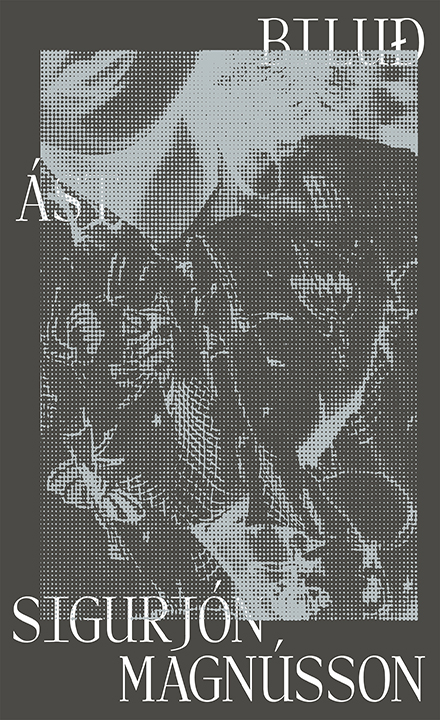
Biluð ást (Mad Love)
Read moreNanna er látin – konan sem Jóhann Máni elskaði. Það var biluð ást. Hér segir frá harkalegum örlögum manns sem hafði margt til brunns að bera, var gæddur góðum gáfum, óvanalegu líkamlegu atgervi og hugdirfsku. En ástina kunni hann ekki að varast.
Sonnettan (The Sonnet)
Read more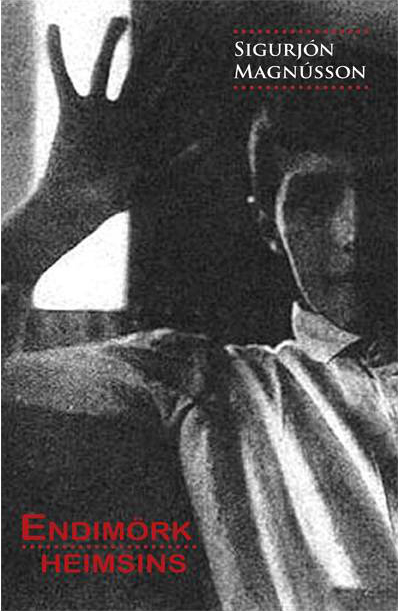
Endimörk heimsins: frásögn hugsjónamanns (The Ends of the Earth: An Idealist´s Story)
Read more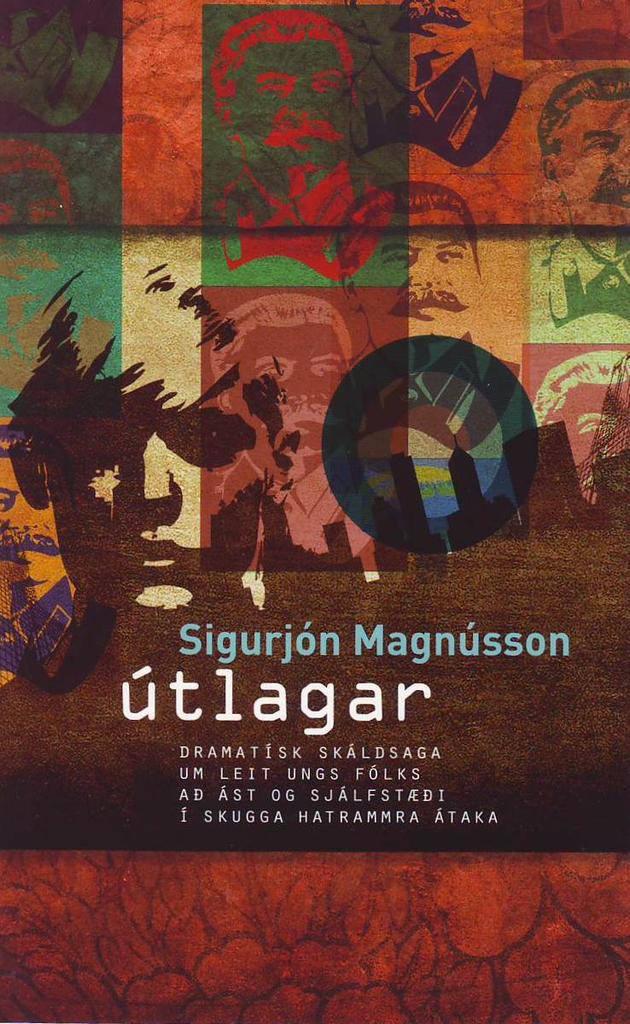
Útlagar (Outlaws)
Read more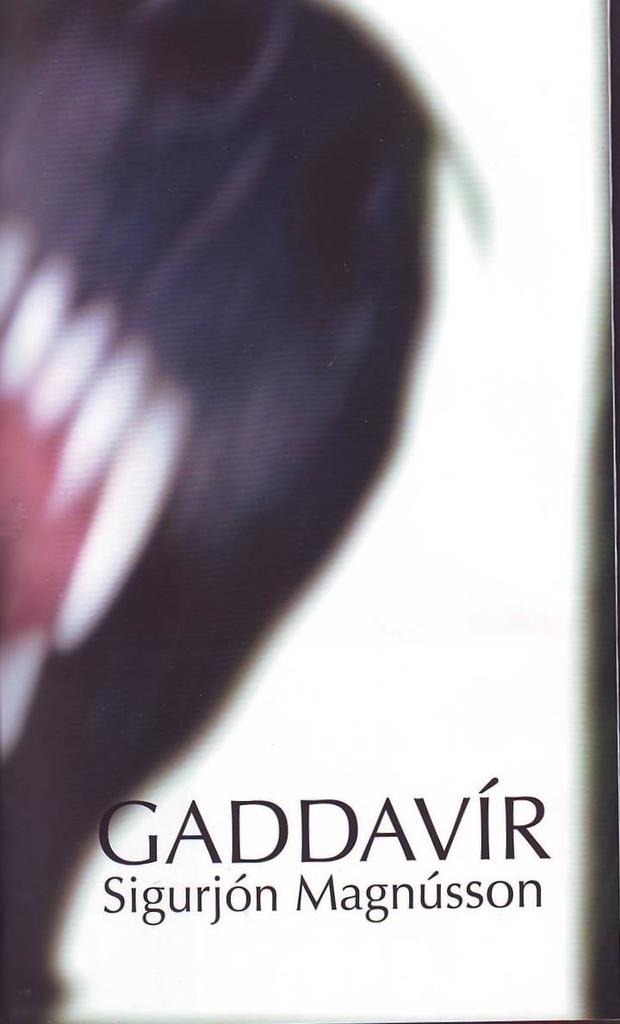
Gaddavír (Barbed Wire)
Read more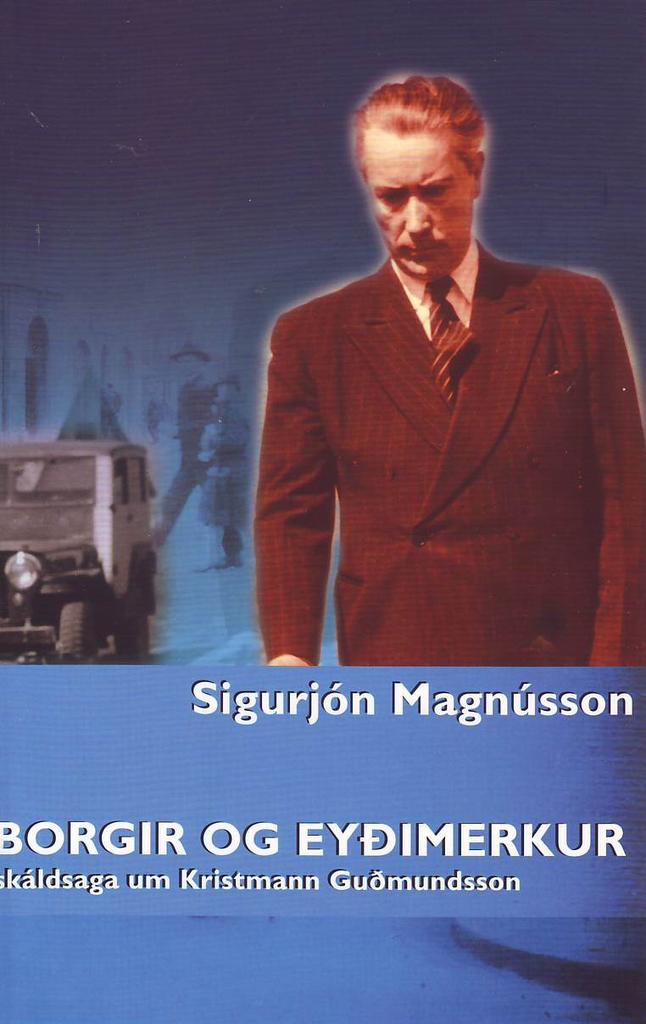
Borgir og eyðimerkur (Cities and Deserts)
Read more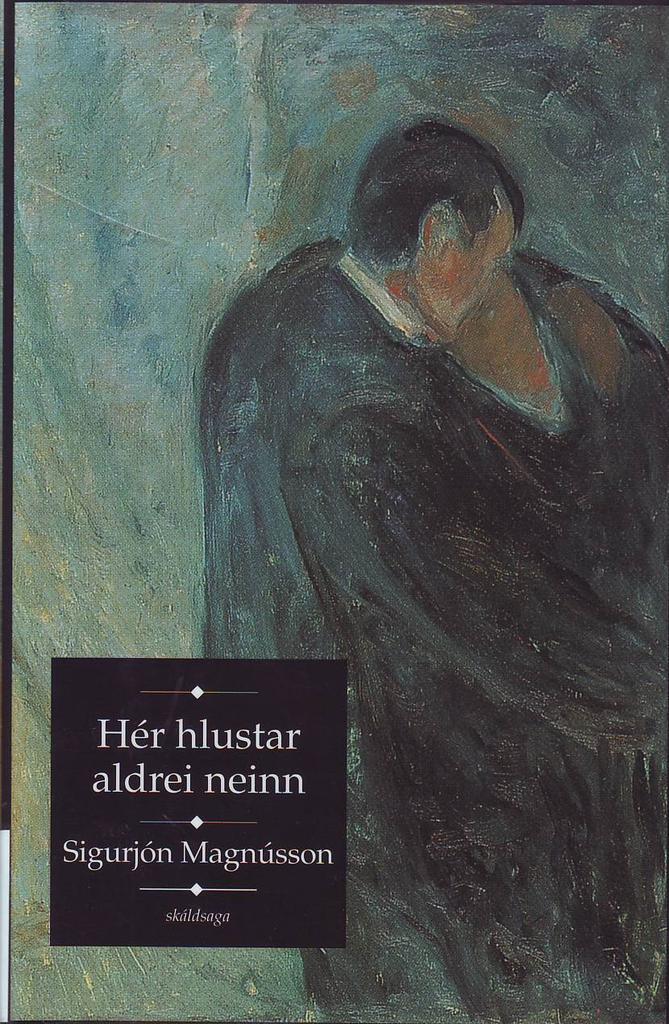
Hér hlustar aldrei neinn (Noone Here Ever Listens)
Read moreGod natt, Silja
Read more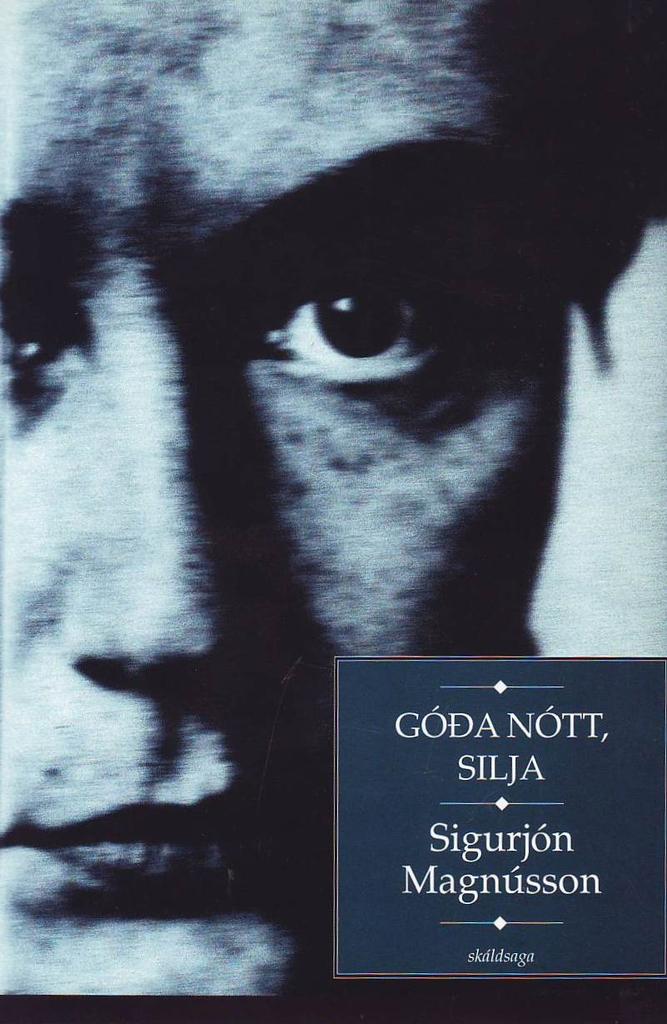
Góða nótt, Silja (Good Night, Silja)
Read more
